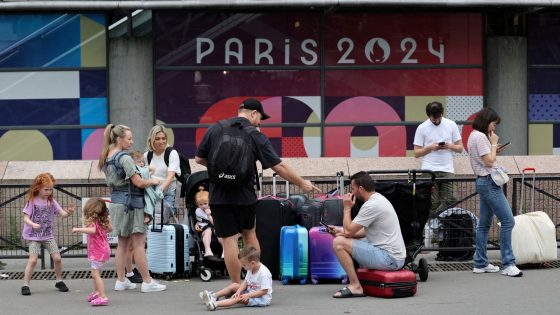The shock caused by the arson attacks on France’s railways came quickly and intensely.
It wasn’t just the fact that trains were delayed and passengers stranded, but the sense that France was under attack just at the moment it was welcoming the world to its capital.
Potential suspects behind French rail sabotage identified – follow live
The first question is who did this, and there is no shortage of theories. Already, many have pointed the finger at Russia, or another state with malign intentions.
Earlier this week, French authorities arrested a 40-year-old Russian national, widely named as Kirill Gryaznov, who they alleged was planning to “destabilise” the games.
It was an arrest that seemed to fulfil a statement made by French President Emmanuel Macron earlier this year when he claimed that Russia was running a “disinformation campaign” to try to undermine the Olympics.
Russia has long recognised the international power of the Olympics, having hosted the summer games in 1980 and the winter games as recently as 2014.
Four years later, though, the opening ceremony of the 2018 Olympic Winter Games in South Korea was disrupted by a cyberattack that was widely blamed on Russia.
Two years after that, the British government said it had evidence that the GRU, Russia’s military intelligence service, had tried to disrupt preparations for the 2020 Tokyo Olympics, which were eventually held the following year. So the idea of a Russian attack on an Olympics is hardly unprecedented.
Russia is banned from sending a team to the games because of a long and sorry history of doping that it has done little to counteract. And, of course, its invasion of Ukraine has put it at loggerheads with European nations and NATO.
Not only that, but it’s only a few months since the Czech Republic released its own intelligence report that Russia had made “thousands” of efforts to either disrupt railways in Europe, or to plan such disruption.
Read more:
Things you’ll see for the first time at the Paris Olympics
The standout athletes you won’t want to miss
So put it together – the tension between Russia and the West, the history of alleged Russian attacks on Olympic cities, the targeting of railways, the embarrassment of being frozen out of the games – it’s not unreasonable for plenty to question whether Russia has played a hand in either planning or inspiring this sabotage.
And when I asked the French sports minister, Amelie Oudea-Castera, whether she thought Russia could be responsible, she replied “possibly”.
But if not Russia, or another state actor with a grudge against France, then who?
While admitting that she did not know who launched this attack, Marine Le Pen claimed that “violence and sabotage against public property” had become hallmarks of “the far left”.
Certainly, some left-wing groups have protested against the staging of the Olympics, along with environmental activists.
But protests, long cherished in French society as a right of every citizen, are one thing – coordinated acts of sabotage are quite another.
And whoever did this damage has not come forward to claim responsibility, begging the question: Why would a protester go to such extreme lengths to cause chaos, and then avoid claiming any publicity?
The French prime minister, Gabriel Attal, has said that the police and intelligence services are now in charge of pursuing those responsible.
He will feel that the pride of France is at stake – that somebody needs to be held responsible.
Source Agencies





